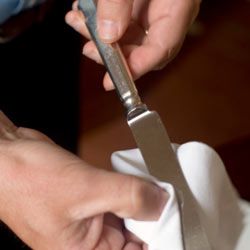By: the Editors of Publications International, Ltd. & Samantha Stallard

You probably don't serve five-course dinners on your fine china or have afternoon tea on a sterling silver tea set every day. Because fine metals and glassware are generally only used at holidays like Thanksgiving and Christmas, they also get cleaned only a couple of times per year. Instead of marking it on your calendar as a dreaded, day-long project, why not clean everything quickly with lemon juice?
The acid in lemon juice really is a cleaning miracle. It can break through just about any rust, dust, or mineral stain and smells great too. Try these five ways to clean fine metals with lemon juice and you'll be prepared just in case the Queen drops by unexpectedly for tea.
Contents
- Sparkling Silver Polish
- Quick Silver Polish
- Clean Tarnished Metal
- Fresh Scented Paste
- Homemade Metal Cleaner
5: Sparkling Silver Polish
Silverware and silver jewelry are usually made of sterling silver, which has a high content of the metal, but also has less expensive metals mixed in, too. Sterling silver is soft and vulnerable to tarnish by exposure to high levels of oxygen. Tarnish can build up over time and silver will appear dull and gray.
Make your silver sparkle! In a bowl, mix 1 tablespoon lemon juice, 1/2 cup instant dry milk, and 1 1/2 cups water. Place your silver in the bowl; let sit overnight. Rinse and dry thoroughly. Double or even triple this recipe if necessary to accommodate your silver.
Advertisem*nt
4: Quick Silver Polish
That silver tea set you inherited from Grandma may not get much daily use. But, it still needs to look pretty sitting in the dining room hutch. Keeping it clean with silver polish is time- consuming and the polish smells funky.
There is another way. If you need clean silver now, pour lemon juice over the tarnished pieces. Polish with a soft, clean cotton cloth. The acid begins cleaning as soon as it hits the silver's surface. Rubbing it around only strengthens its cleaning power.
Advertisem*nt
3: Clean Tarnished Metal
When different metals are exposed to each other, especially in the presence of moisture, they can quickly tarnish and lose their shine. Therefore, you'll want to stop the problem as soon as you spot it.
Clean slightly tarnished brass or copper with half a lemon or lime dipped in salt. The salt works the acid from the lemons or limes deep into the tarnish and scrubs away the bits of dirt and grime. Consider it an exfoliating facial for your copper and silver.
Advertisem*nt
2: Fresh Scented Paste
Brass and copper can be found in the pipes, fixtures and instruments throughout a house. When these metals tarnish they begin to turn green, not brown or gray like other common household metals. Be on the lookout for unusual colors and rough textures on brass and copper and take the time to clean them.
Use this homemade paste to clean brass or copper. Mix enough lemon juice and baking soda to form a paste. This natural cleaning solution has a fantastic scent that will keep your house smelling fresh. Wouldn't you rather have a house smell of lemons than of chemicals?
Advertisem*nt
1: Homemade Metal Cleaner
Take the time once a year to clean the metal surfaces in your home. The task will seem less daunting if you set aside one morning dedicated to cleaning. Here's another homemade paste to clean brass and copper. Combine lemon juice, salt, and yellow cornmeal. Rub it onto brass or copper using a soft, dry cloth; rinse with cool water and dry.
The abrasive texture of the salt and cornmeal buffs tarnishes off the soft metal surfaces and restores the brass and copper to their original condition. Now there's no excuse not to have sparkling metals around the house.
Advertisem*nt
Adapted from "Lemon Juice: Lighten Your Hair and Solve Household Problems," © 2009 Publications International, Ltd.
Cite This!
Please copy/paste the following text to properly cite this HowStuffWorks.com article:
Citation
Advertisem*nt
Advertisem*nt
Loading...
\n\n\t\t\t\t
`;t.byline_authors_html&&(e+=`By: ${t.byline_authors_html}`),t.byline_authors_html&&t.byline_date_html&&(e+="|"),t.byline_date_html&&(e+=t.byline_date_html);var i=t.body_html.replaceAll('"pt','"pt'+t.id+"_");return e+=`\n\t\t\t\t
\n\t\t\t\t
\n\n\t\t\t\t
${i=i.replaceAll("#pt","#pt"+t.id+"_")}
\n\n\t\t\t
`}(a);this.loadedDiv.innerHTML+=n,document.title=a.title+" | HowStuffWorks";let s="content-loaded-"+a.id,l=document.getElementById(s);l.dataset.contentId=a.id;let o=l.querySelectorAll(".lazyload");HSW.utilities.lazyLoadElements(o),HSW.ux.editorial.init({twitter:!0,facebook:!0,instagram:!0}),l.querySelectorAll(".toc a").forEach(t=>{t.addEventListener("click",t=>{t.preventDefault();let e=t.target.dataset.target,i=document.querySelector("a[name='"+e+"']");i?i.scrollIntoView({behavior:"auto"}):console.error("Unable to locate target with name "+e)})});try{if(userData.adsActive)if(HSW.utilities.isMobile()){l.querySelectorAll(".ad-mobinline").forEach(t=>{t.setAttribute("id","ad-wrap-mobinline"+r),t.childNodes[0].setAttribute("id","ad-div-mobinline"+r),void 0!==HSW.ads&&HSW.pq.add(()=>{HSW.ads.addNewUnits(["ad-div-mobinline"+r])},"ads"),r++})}else{let t=document.createElement("div");t.setAttribute("id","ad-after-"+e),t.classList.add("ad-inline","mb-8","bg-gray","w-max-full","h-min-90","text-center");let a=document.createElement("div");a.setAttribute("id","ad-div-inline"+i),t.appendChild(a),l.after(t),void 0!==HSW.ads&&HSW.pq.add(()=>{HSW.ads.addNewUnits(["ad-div-inline"+i])},"ads")}}catch(t){console.error(t)}if(window.setupSinglePageUX(l),history.pushState)try{history.pushState(null,a.title+" | HowStuffWorks",a.href)}catch(t){console.warn(t)}var c=[];a.taxonomy.forEach((t,e)=>{c[e]=t.title.toLowerCase()});var d=c.join("/"),h=[];a.authors.forEach((t,e)=>{h[e]=t.first_name.toLowerCase()+" "+t.last_name.toLowerCase()});var g=h.join(",");pageMetricsData.href=a.href,pageMetricsData.title=a.title,pageMetricsData.tax=d,pageMetricsData.aType=a.asset_type,pageMetricsData.cType=a.type+"-continuous",pageMetricsData.template=a.template,pageMetricsData.source=a.source,pageMetricsData.sponsor=a.sponsor,pageMetricsData.author=g,pageMetricsData.contentid=a.id,pageMetricsData.image=a.hero_image,pageMetricsData.page=0,pageMetricsData.pubDate=a.publish_date.slice(0,10),pageMetricsData.editDate=a.last_editorial_date.slice(0,10);const u=/[^\da-z_]/i;let p=HSW.utilities.isMobile()?"hsw_lite":"hsw";a.taxonomy.slice(1,3).forEach((t,e)=>{p+="|"+t.title.replace(u,"").toLowerCase()}),pageMetricsData.adUnit=p,Alpine.store("share",{title:pageMetricsData.title,url:pageMetricsData.href,image:pageMetricsData.image}),function(t,e){let i=t.href.split(".com/").pop();dataLayer.push({event:"virtual-page-view",virtualPageUrl:i,virtualPageTitle:document.title,pageNbr:0}),dataLayer.push({event:"raw-event-interactive",eventCategory:"page-interaction",eventAction:"continuous-load",eventLabel:"new-content",eventValue:e+1,virtualPageUrl:t.href})}(a,this.items.length);const m={...pageMetricsData};t.items.push(m);for(var f=document.getElementsByClassName("new-content-loaded"),v=0;v